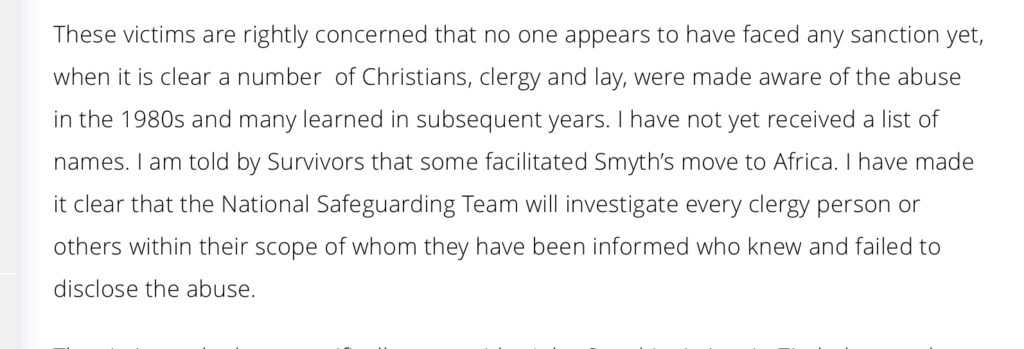
I had thought of dedicating an entire blog to the topic of the life of Archbishop Tutu. The reason for not doing this was because so much has been said by others and I knew I would have difficulty in saying anything fresh. The other reason is that ++Tutu’s political and religious struggles took place in a setting that I have no experience or knowledge of. That was my decision until Saturday 1st January. On that day a letter was published in The Times on the topic of Church leadership from Canon Mark Oakley. He came up with the magnificent word, Tutufication, to describe the potential influence of Archbishop Tutu on the leadership culture of the wider Anglican church. Oakley was attempting to point out to Times readers that there is a different style of episcopal leadership potentially available to the Church of England. This is not at present being offered to us by our current Church leaders. In particular, he contrasted the culture of managerialism and a suffocating need for unity/conformity with the individual fearless prophetic witness offered by Tutu. Put simply, there are no current examples of leadership in the Church of England which inspire or capture the imagination and attention of the British public as Tutu did.
The words of Canon Oakley which have led to much discussion on the social media, included these: “We need a brave Tutufication of the Church, allowing bishops more creativity, freedom of speech and honesty about what they believe, with a commitment to never let religion compromise justice.”
Those of us who have been inspired by the life of Desmond Tutu have not been calling for him to be instantly placed in the Anglican liturgical calendar for an annual commemoration. This may of course happen. The most impressive thing about Tutu’s life for many of us was the way that he was allowed to speak openly and freely about a number of topics that really matter to people – racism, homophobia, justice, forgiveness and reconciliation. There was a glorious spontaneity about his utterances. Nevertheless, he attracted plenty of criticism during his lifetime and indeed was sometimes in physical danger because of his views. Some of his attitudes may indeed have been wrong. I in no way want to suggest that he qualifies to be a Christian saint. But the thing that is remarkable and assures us of his permanent place in the roll of great Anglicans, was the fearless way he fought evil and injustices. These were especially manifested in the unjust structures of his native land, South Africa. He occupied a difficult place in the political spectrum, neither accepting apartheid nor seeking its overthrow through violence. His position as an Anglican bishop (later Archbishop) gave him a public platform so that he could be heard. His position was not popular, and, though applauded by many, he faced opposition and conflict for much of his life.
The new word ‘Tutufication’ helps us to see a distinct way of exercising episcopal power which is quite different from the one we have in the Church of England. As my readers who follow this blog regularly know, I have a personal interest in the way that our episcopal leaders have seemed so incapable of getting things right in the safeguarding crisis of the past ten years. In summary, the failures of Church leaders have frequently failed survivors of abuse. The leaders have also failed to protect the wider cause of justice and truth within the institution. Canon Oakley in his list of critiques of the current functioning of the episcopate, hints at a stuffy, highly centralised way of exercising authority. This fails to engage either with the ordinary membership in the pews or the demands of those who have suffered from abuse within the system.
Let us take two qualities for which ++Tutu was known, but which seem to be so little in evidence today in England. The first is the quality we describe as prophetic. Prophecy is one of those words that is constantly misunderstood by many people. In Scripture, the book of Daniel with its detailed foretelling of future events, is thought by many to be what prophecy is all about. In fact, the Jewish compilers of the Hebrew Bible never regarded this work as following in the great classical Hebrew traditions of prophecy. The book was relegated to sit among the miscellaneous ‘writings’. What we have is a work, written in the intertestamental period, around 165 BC, containing a genre of writing that today we describe as apocalyptic. Classical Hebrew prophecy, exemplified by Amos and Jeremiah, was the kind that has inspired many modern Christian heroes like Martin Luther King, Romero and Huddleston. It was about proclaiming the realities of the present time from a divine perspective. The Christian prophet is one who proclaims, not the future, but the meaning of the present, interpreted from the perspective of God’s will. The Hebrew prophets, sometimes at great physical risk to themselves, said unpopular and unpalatable things, revealing what they saw to be the will of God for Israel and Judah. What the people wanted to hear was that God was giving them endless peace and prosperity. What they heard instead was far less welcome. It was a message about repentance and the announcement of imminent disasters. I am no expert in Tutu’s political/prophetic message, but it can safely be summarised that his message was often, like that of the OT prophets, unacceptable, particularly to the holders of political power in the South Africa of the 70s, 80s and 90s.
The vocation of the Church to be a beacon of prophecy in the classic Old Testament sense, is not one that would be widely welcomed in Britain in our own century. Much prophecy, in its habit of challenging existing power structures, would probably be called far too left wing for our current establishments to cope with. This post is not meant to be in any way pressing a political view. Nevertheless, a healthy exploration of political opinions and ideas is not something that we or our episcopal leaders should shy away from. What we find in practice is, not an attempt to hold a healthy debate representing the complete spectrum of political opinions, but what appears to be an effort to muzzle every expression of political opinions. The fear of being thought ‘political’ has shut down much expression of opinion among our episcopal leaders. The Church has to a considerable extent become voiceless. As far as the political issues of today are concerned, as well as the issue of safeguarding, church leaders be seen to be acting neither with courage nor clarity. The spirit of Tutu in the Church of England is hard to discern.
Tutufication would be one way of releasing the Church from its political straitjacket. From the perspective of this blog, one urgent need is for the bishops is to be allowed the freedom to prophesy in the safeguarding arena. Many bishops know incidents of abuse from long ago but, in their current position of influence in the Church, they are forbidden from saying anything potentially critical. Dirty secrets from the past might be revealed and the reputations of current leaders might be damaged. Bishops are required by their position and status in the organisation to observe silence and do absolutely nothing to speak about all that has gone wrong. The consecration to the episcopate seems to involve receiving a large zip-fastener over one’s mouth. Nothing, no opinion or statement that might be helpful to survivors, can ever be released on this topic or anything else, unless sanctioned at the centre.
Many of us have been admirers of Bishop Vivienne Faull of Bristol. Her safeguarding record at York as Dean was exemplary, if controversial. She also made some bold statements about the safeguarding failures she observed at Gloucester when Peter Ball was Bishop, and she was a junior member of the cathedral staff. Her remarks were challenging to the system and she spoke of the forces trying to silence her. She recounted at the time of the IICSA report: ‘The tribalism and clericalism identified by IICSA silenced and marginalised me (and others). It still does.’ The announcement that Vivienne was to be a Diocesan bishop encouraged many of us to believe that her bold, even prophetic, stand on safeguarding matters would be represented in the House of Bishops. Then we also learned that she was to be assisting +Jonathan Gibbs in his safeguarding role. Since that date, it has been as though the volume dial has been turned right down. I may have missed some statement, but the survivors that I am in touch with have not heard one word which might encourage them to believe that she was still interested and working on their behalf. If we can suggest another word to describe a process at work in the Church of England, what we are witnessing seems to be that ‘detutufication’ is alive and well.
The second quality we saw in ++Tutu was his careful and laborious search for reconciliation and peace. Most of us have heard of reconciliation process which Tutu oversaw in South Africa through the Peace and Reconciliation Commission. This took the former participants of the political conflict and provided the space and the time for them to listen to the pain that the other side had suffered. It was an incredibly costly affair, and it took the patient dedication of an exceptional Christian leader like Tutu to try and make it work. From the Christian point of view it was a clear demonstration that Christian values and beliefs can make a difference in situations of conflict and point to a better future for everyone, whether or not Christian. The success or failure of the Commission is not what I am arguing for at this point. I am merely pointing out that Tutu has shown how the influence of the episcopate can be put to work. Tutufication of the Church and especially its leaders, can make a powerful difference in a society and point all to the possibility of transformation. South Africa is far from a healed society, but some of the bitterness has been neutralised to make that society somewhat less divided than if he had never lived.
The brief letter by Mark Oakley has begun a discussion in the Church of England about the kind of leadership we would like to see from our bishops and archbishops. Tutufication represents, in summary, the fearlessness, the striving for justice, the courage and fierce conviction that marked the life and work of ++Desmond Tutu. Even a little of his outstanding passion would go an enormous way in helping our church regain the respect of society. Tutufication is also especially needed in the world of safeguarding. His costly struggle to bring about peace and reconciliation also points us in a fresh direction. Instead of of the fear-dominated and defensive legal responses of the Church authorities towards victims and survivors, we long to see the compassion and outworking of Christian love. Tutufication points us in a new direction and towards a new church culture. Above all his message and example is to our Church leaders. There is another way of exercising Christian leadership. Instead of fear, truth avoidance and the concern merely to protect the institution, we long to see openness, integrity, justice and love. With them in evidence, the Church of England might have a better chance of regaining the respect and admiration of society at large.








